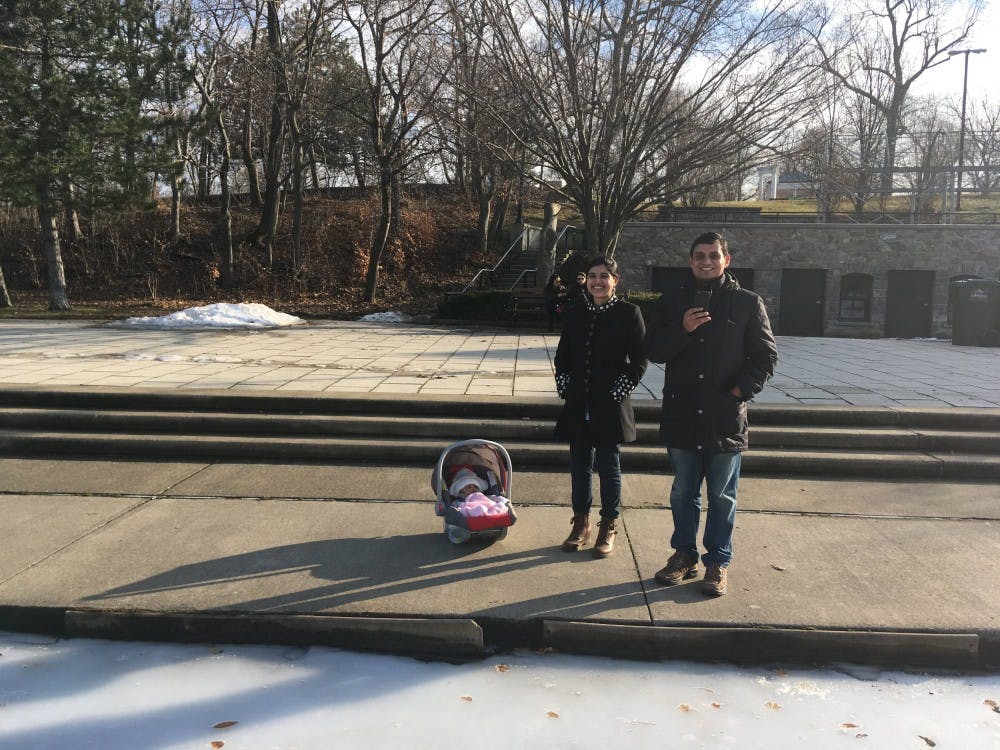If you ask one of Ajay Singh’s colleagues about their fondest memories of the researcher, his infectious smile and laugh are the first things that come to mind.
Colleagues said the 32-year-old research associate enjoyed spending time with his wife and daughter, who recently turned one year old. Colleagues described him as a calm, funny family man who was passionate about his research.
Singh was involved in high-level research at UB, but never hesitated to step away from his work to help a student or make time to get ice cream with a colleague.
His students and colleagues believe this easygoing yet hard-working spirit embodied Singh, who died on Oct. 20 choking on food at his desk. Singh came to the university in 2015 from India to work in the Institute for Lasers, Photonics and Biophotonics on organic synthesis, nanomedicine, drug delivery, photoacoustic imaging and molecular imaging. Singh was also published widely in top-tier scientific journals, was an editor for two respected journals and had several patent applications.
Many colleagues and students were shocked at the news of his passing and remember him as a kind soul who was vital to research in the ILPB.
Paras Prasad, a SUNY distinguished professor of chemistry and executive director of the
ILPB, talked to Singh the day before he died.
Prasad said he and Singh were supposed to meet on Oct. 20 to discuss an upcoming trip to India for a research conference. While Prasad drove to campus to meet Singh, a colleague called him told said they found Singh unresponsive at his desk. Prasad said he was devastated by the news.
“He was the sweetest person: very easygoing, very calm. It’s a horrible loss,” Prasad said. “He was easy to work with and really helpful to youngsters. He was always available and eager to help his students with a smile. I know he’ll be missed by many.”
Prasad said after Singh passed, his family came to the U.S. to retrieve his body and returned to India where he was later cremated. The ILPB held a small memorial on Oct. 22, and Prasad showed Singh’s picture at his conference in India to more then 300 researchers who mourned his death.
Singh’s recent research focused on new approaches to detect Alzheimer’s and glioblastoma in their early stages. Prasad said Singh’s work would have had a “large societal impact” and positively affected the Buffalo medical community.
“Ajay was a very valuable [colleague],” Prasad said. “He was working on some very exciting high-impact research. And that’s a big setback. I mean, first of all, it’s a tragic loss for all of us here who have interacted with him. He was involved in some key research that is now stuck without him.”
Chang-Keun Lim, a research associate at the ILPB, knew Singh for over eight years, as they completed the same Ph.D. program in South Korea before coming to UB. Lim and Singh shared a mutual love of food and they would go out to lunch together every Friday.
Lim said they enjoyed one final meal at a local Korean restaurant the day before Singh died. He reminisced about Singh’s love for cooking and said it was so good that Singh would cook instead of ordering catered food at lab parties.
“He was an amazing cook, his chicken curry was the best Indian food I’ve had in my entire life,” Lim said. “We always enjoyed getting Chinese, Korean and Indian food. I think a lot of Indian people don’t like food besides Indian food, but Ajay was adventurous, we went to a lot of restaurants together. I’ll miss that.”
Students who worked with Singh describe him as “bright light” who helped them through some of the hardest times of their Ph.D. programs.
Students said they planned on teaching Singh how to drive. He lived close to campus and walked to school every day because he enjoyed the exercise.
Julia Bulmahn, a medicinal chemistry Ph.D. student, said she could always turn to Singh if she had any issues with her research. In an environment that she described to be “intimidating” and “stressful” at times, she said Singh was always there to brighten up her day –– often with that smile of his –– and help her with her work.
“Ajay was probably the most helpful person that we had in our [department],” Bulmahn said. “It was always so nice to go and ask him questions because regardless of what it was, he was smiling and he didn't make you feel inferior or like your question was stupid. He was never negative or made me feel like I was wrong for asking for help. He was really one of the nicest people I've ever known.”
Bulmahn said she drove Singh downtown to the Clinical and Translational Research Center the day before he died. On the drive down, they talked about how excited he was for his daughter’s first birthday.
“His daughter turned one a few days after he passed. It’s so sad he couldn’t see her on her birthday,” Bulmahn said. “He was just always talking about how excited he was to see his family again, to go back to India and about his future. There’s really just no words.”
Olivia Geneus a physical chemistry Ph.D. student, said she’ll miss visiting Singh in his office. She and other students regularly dropped by to chat about life or get help on research.
“It’s just so strange that when we have a question we can’t say ‘Oh, let’s go ask Ajay downstairs’ anymore,” Geneus said. “We went to his office at least once a week … maybe more like once a day. It was just so shocking. It’s just not going to be the same around here.”
Correction: A previous version of the article states Singh came to UB in 2016. He came to UB in January 2015.
Max Kalnitz is the senior news editor and can be reached at max.kalnitz@ubspectrum.com





